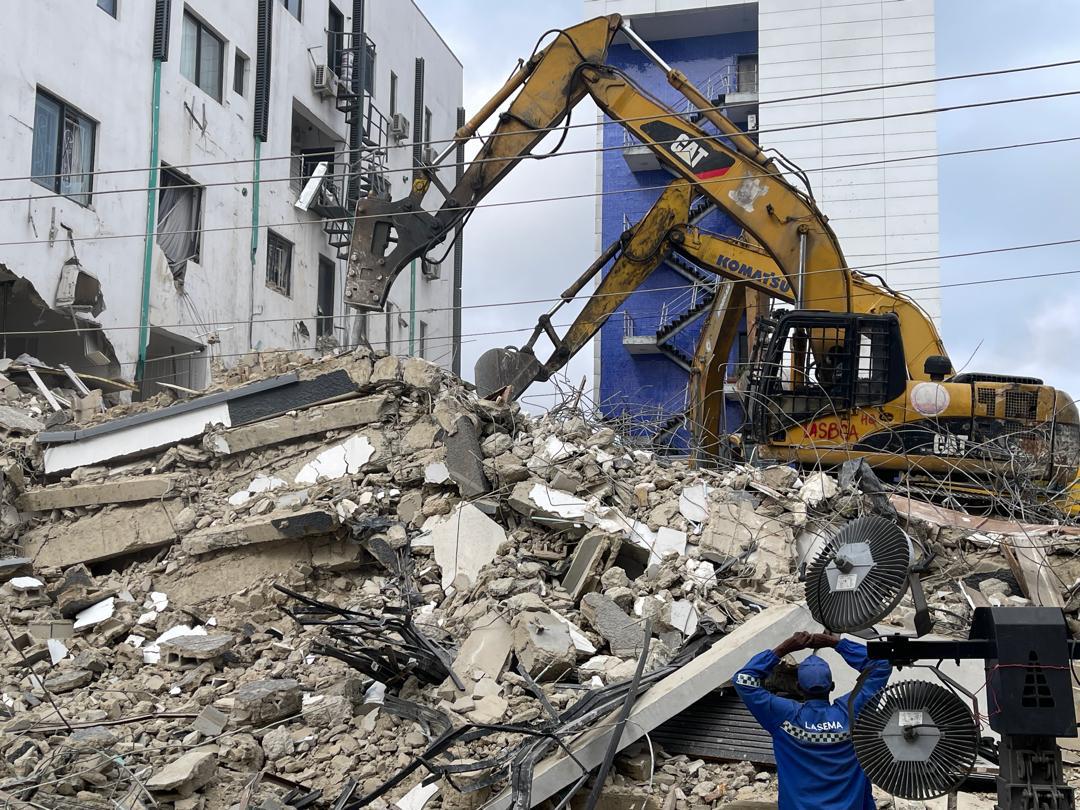It is distressing that building collapses have become another recurring tragedy, claiming the lives of innocent Nigerians. As citizens lament the loss of their kinsmen to the heinous activities of criminal elements, including terrorists, kidnappers and armed herders, even structural failures, mostly caused by the inability to enforce the simplest safety standards, are sending other people to early graves.
Each incident is a sad reminder of lives cut short, families devastated, and investments wasted. The menace does not portray Nigeria as a serious country. It is a shameful situation that the government must take practical and sincere moves to address urgently.
From Lagos to Abuja, Port Harcourt to Kano, it is the same worrisome reports of people dying in building collapse, government launching inquiries and promising to tackle the causes. And before anything would be seen as being done to address the problem, another building would have collapsed, and a new set of people would have been killed! While professional bodies, state governments and agencies continue to roll out investigative reports and communiqués, some Nigerians are asking the most pertinent question: when will words translate into a real solution?
Unsettled by the challenge of frequent building collapse in the country, the Nigerian Institute of Building (NIOB) recently declared its intention to confront the causes. The institute, which noted the existence of adequate regulatory laws, observed that weak enforcement is the biggest cause of building collapse. It paves the way for sharp practices with dire consequences for unsuspecting people who fall victim. As builders cut corners with substandard materials, developers employ quacks to save costs, and the compromised enforcement officials look the other way.
It was learnt that many states have not domesticated the National Building Code, leaving dangerous gaps in regulation. NIOB’s renewed focus on advancing builders’ knowledge and skills is commendable, but professional capacity without enforcement is like a blueprint without a foundation. It will be impressive on paper but meaningless.
Similarly, the Federal Government recently inaugurated a National Building Code Advisory Committee to tackle these long-standing concerns. This followed the earlier creation of a ministerial task team to investigate recent collapses. The intent, at least on the surface, is laudable: to review, update, and drive uniform adoption of the building code across the federation. Lagos State Governor Babajide Sanwo-Olu has also joined the conversation, calling for a single enforceable code adaptable to local realities. His call reflects an important fact that, without uniform standards and political will to implement them, piecemeal regulations in different states will continue to fail, leaving citizens vulnerable.
But Nigerians have every reason to be sceptical. The National Building Code has existed for years, yet it remains largely ignored. Advisory committees come and go, task forces are set up with fanfare, but buildings still crumble with sickening frequency. Obviously, the problem is not a lack of laws, conferences, or codes but the absence of decisive actions.
Inspectors are often underfunded, poorly trained, or compromised. Developers who flout regulations rarely face meaningful sanctions. Professional bodies, eager to protect their reputation, sometimes hesitate to discipline erring members. The result is a vicious cycle: lives are lost, inquiries are held, white papers are issued, and the next collapse occurs with little learned from the last incident.
If the government is serious this time, it must go beyond announcements and conferences. The National Assembly should give the building code the required full legislative backing with clear enforcement mechanisms and strict penalties for non-compliance. States must be compelled to domesticate and implement the code uniformly.
Regulatory agencies need more than token funding; they require resources, training, and autonomy to conduct thorough inspections at every stage of construction. Professional bodies, including NIOB, must take ownership, naming and sanctioning erring members instead of closing ranks. And the judiciary must play its part, ensuring that defaulters—whether quack builders, unscrupulous developers, or corrupt officials—face swift and deterrent consequences.
The public has a crucial role to play in curbing this menace. Nigerians must imbibe the habit of demanding compliance certificates before renting, buying, or leasing properties. Too often, citizens unknowingly move into unsafe buildings, trusting that “the government has approved it.” Communities must also be educated through awareness campaigns about the dangers of patronising unqualified builders or ignoring visible structural defects. A culture of safety can only thrive when the demand for accountability comes not just from the top but also from the grassroots.
It is also crucial to highlight the role of corruption in this deadly scourge. Building approval processes in many states are riddled with bribery, allowing defective plans and substandard materials to slip through. Some developers deliberately ignore structural engineers’ advice, preferring cheaper alternatives. Contractors inflate costs while still cutting corners. This pervasive rot means that even well-meaning regulations fail before they are tested. Tackling corruption in the building sector must, therefore, be part of any meaningful reform agenda.
Another area that requires urgent reform is urban planning. Nigerian cities are expanding rapidly, with population pressures forcing many to build vertically in already congested areas. The government must know that high-rise construction requires advanced expertise, yet many such projects are handled by those with neither the training nor the approval to do so. This must be stopped. Authorities must enforce zoning laws and ensure that only qualified professionals handle high-risk projects. Collaboration with universities, research institutions, and international partners could also help to modernise building practices and introduce new and safer technologies.
The human cost of building collapse cannot be reduced to numbers. Behind every statistic are mothers, fathers, children, and breadwinners whose lives are violently cut short. Survivors live with trauma, disabilities, and financial ruin. Families who saved for years to own a modest home watch their dreams turn to rubble.
It is this human dimension that should weigh heavily on every policymaker, professional, and citizen. We must reject the normalisation of these tragedies as if they are acts of fate. Building collapse has nothing to do with destiny; it is the predictable outcome of negligence, corruption, and weak governance.
Nigeria has talked long enough; the time has come to build safely, sustainably, and responsibly. The choice is stark: either we enforce standards today or we continue to mourn tomorrow. The safety of Nigerians should be paramount.






